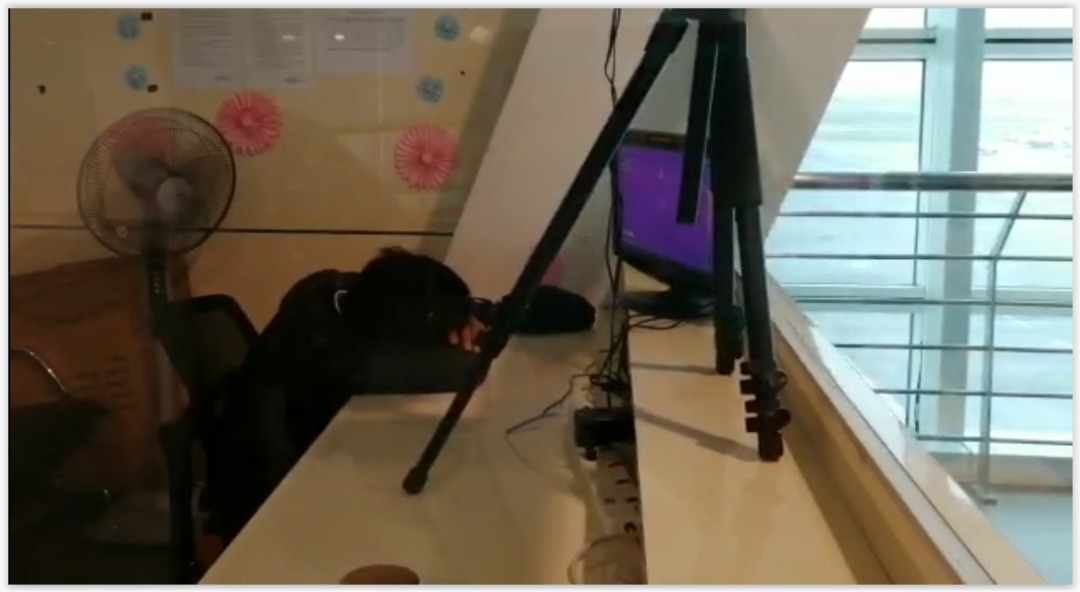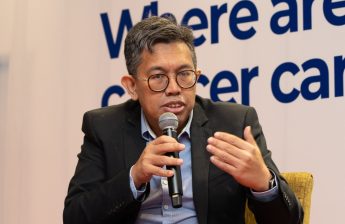KUALA LUMPUR, Jan 13 — The Ministry of Health (MOH) has issued warnings to two staff working at klia2’s thermal scanners who were caught sleeping and using their mobile phone on duty.
A video taken by Federation of Private Medical Practitioners’ Association Malaysia (FPMPAM) president Dr Steven Chow showed two men at the booth in the low-cost airport — one sleeping, and another busy on his phone — at around 12.45pm on December 26 last year. The latter did not seem to know that he was being recorded.
Health Minister Dzulkefly Ahmad said he was informed of the matter, saw the video for himself, and said it gave a bad impression to his ministry, even if the MOH officer sleeping was ill or not fit to work.
“I can give him a little benefit of the doubt… if he’s not well and so on, but the one playing on his phone, we cannot take lightly, maybe,” he told reporters after delivering his New Year message at his ministry in Putrajaya.
“Whatever it is, the bottomline is… we need to raise (the levels of) discipline there.”
Action has been taken, investigations were carried out, and warning letters were given to both staff, he added.
In a brief statement later, MOH said show-cause letters have also been issued to the two staff, while all MOH officers at entry points in the country have been briefed about the importance of screening efforts and how it can be more effective according to existing protocol.
Dr Chow, who shared the video he took with CodeBlue, said the incident last December was not the first he has witnessed, alleging at least two other previous occasions over the past two years.
“MOH needs some serious house cleaning,” Dr Chow said. “A regular event if you care to look.”
Earlier this month, Malaysia started screening travelers arriving from Wuhan, China, after a mysterious pneumonia outbreak, suspected to be caused by a new virus, in the central Chinese city that has killed a man so far.
Meanwhile, Dzulkefly said the country has enough vaccinations for the current Influenza A (H1N1) outbreak, which has seen several schools reporting cases among their students, and private hospitals in the Klang Valley allegedly not having enough beds and anti-influenza drugs to cater to increasing flu patients.
“Obviously, the situation is quite alarming when all citizens go to private institutions, primarily, and they do not have a stockpile (of vaccination doses), unlike us (MOH). So because of that, when demand exceeds supply, a shortage forms, and that is why they (patients) are worried.
“Whatever it is, it has been resolved, because there is now an increase of (vaccination doses). We want to make sure that the supply is achieved (sic),” he said, adding that he believes the issue is a temporary one.
Dr Ramli Zainal, senior director of the Pharmaceutical Services Programme at MOH, told reporters that MOH imported an extra 92,700 vaccination doses on December 2 last year, in light of the spike in influenza cases, in addition to the 600,000 doses it imported for 2019.
MOH will also import another 60,839 doses on January 20, he added. The doses are for the private sector, while local pharmaceutical company and distributor Pharmaniaga has maintained that it has a sufficient supply of antiviral drugs at MOH facilities for at least three months, Dzulkefly said today.
Meanwhile, on a claim by the Malaysian Medical Association (MMA) that general practitioners (GP) are the last in the list for getting flu vaccines, MOH said special approval has been given to private health care providers for almost a million capsules or tablets of the antiviral drug, Tamiflu, to benefit 100,000 patients.
Dr Ramli said while only five companies provide flu vaccines to the public sector, the Health director-general has given special approval for alternative supplies to other companies.
“Private doctors can go and get it for themselves,” he said, adding that they could also get it imported on the same day, provided that they apply for it through MOH first.
MMA president Dr N. Ganabaskaran yesterday said priority was normally given to public hospitals, followed by private hospitals, while the “leftovers” are supplied to the 7,000 doctors in general practice, and pointed out that family physicians are the community’s first point of contact, estimating about 70 million annual GP visits in Malaysia.
The New Straits Times reported that a one-year-old girl recently died from Influenza A, or H1N1, from Pahang, while her twin brother recovered.
On a separate note, all four passengers in a car crash this morning, including World Number 1 Japanese shuttler Kento Momota, are currently in stable condition, and are being treated at Hospital Putrajaya. In an early morning accident today, the driver of a van shuttling the shuttlers was killed on the way to the Kuala Lumpur International Airport (KLIA).








